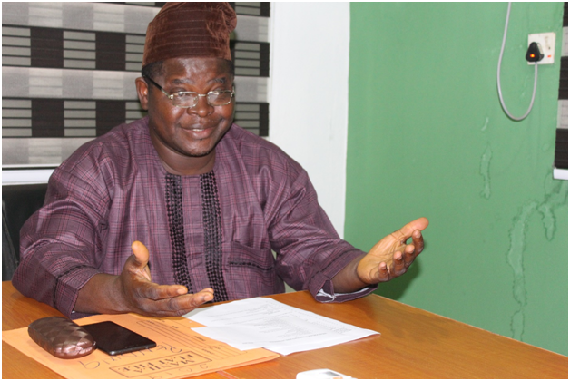– Says Lagos ACPN open to dialogue on health insurance
Amidst the uproar that greeted the recently launched Lagos State Health Service Insurance Scheme, which allegedly denied pharmacists in Lagos State from participating as providers, Pharmanews recently reached out to the Chairman, Association of Community Pharmacists of Nigeria (ACPN), Lagos State Chapter, Pharm. Olabanji Benedict Obideyi, for his views on this and other important pharmacy-related issues in the state. Below are the excerpts of the interview.
Congratulations on the recently held Annual General Meeting of the ACPN, Lagos State, the first since you took over as chairman. How did you feel about it?
Indeed it was a great reunion, especially for some of our members who had not being regular at our bi-monthly meetings. The bye-laws of the association were presented and ratified, while some motions raised were supported and invariably became resolutions that are now binding on members. Some issues affecting our practice were raised and addressed reasonably well. All executive committee members were re-elected for another term of 12 months.
You had some goals set for yourself at the inception of this administration, it’s now one year since you came into office, how many of these goals have you achieved so far?
Yes, it is normal for every incoming administration to have goals and objectives and ours was no exception. We planned to renovate our secretariat and train the staff to make them more productive. To a large extent, we have done this; though work is still in progress.
Zonal visitation is another programme we had decided to do and, to the glory of God, we have been able to visit five zones. We used the visit to inform members of what is being done at the state level and encouraged them to fulfill their obligations to the association. We have however mapped out strategies to ensure that all the remaining zones are visited before the end of this year.
At the inception of this administration, codeine-containing cough syrups saga pervaded the whole place, but we rose to the occasion, and called a press conference to present our position. The police harassments that followed the pronouncement of restriction on dispensing of codeine-containing cough syrups were repelled by petitioning the Lagos State Police Command on the illegal operation of the then F-SARS, who took it upon themselves to be raiding pharmacies.
The aftermath of the codeine matter led us into conceptualising and implementing a project called PROJECT Rx. This project is basically about campaign against drug misuse and abuse. It is a seven-step project and we have been able to do the first three steps successfully. We are looking for organisations to partner with to sponsor other steps.
Emblem acquisition is another area we have worked on to make it seamless. Members who apply for the emblem can get it approved within two weeks, provided all the necessary documents are attached.
Integrate E-programme is another partnership, building the capacity of our members in areas of initiation of injectable contraceptives. To date, close to 230 members from different zones have been trained and are offering injectable family planning services in their premises.
There are some other achievements which time would not permit me to mention. However, computerisation of our operations and establishment of e-secretariat are other things we had in our plan but have not been achieved due other pressing matters we had to attend to last year. However, we are going to see to the implementation of these and other things we plan to do this year.
There has been uproar concerning the recently launched Lagos State Health Service Insurance Scheme, which allegedly denied your members from participating as providers. Can you please shed more light on this?
The concept is very good because what is being canvassed for globally is universal health coverage, and this is one way of achieving it. It is aimed at making healthcare services affordable to all and sundry.
ACPN made presentations during the public hearing on laws being put together for this insurance, but most of our recommendations were never adopted. I remember we suggested that, at least, three members from HCPAN to be on board of the agency to drive this insurance so that other professionals, in addition to doctors, could be adequately represented; but only one slot was given. We also raised the issue of accreditation of pharmacists and pharmacies to be done by Pharmacists Council of Nigeria, being that drugs matters are under “exclusive” list; again this was not adopted. Rather the laws make provision for Health Facility Monitoring and Accreditation Agency (HEFAMA), an agency of the state government to be the only agency to accredit providers under this scheme.
The main issue started with the planned lopsided implementation of the scheme, fashioned after the National Health Insurance Scheme, which has been labelled as fraud. It is a pity that we don’t learn from our mistakes in this country. Pharmacists under this scheme are secondary providers. Prescriptions are supposed to be written by doctors and sent to the community pharmacy for filling, especially considering that most of the hospitals, including the private ones and Primary Health Centres, do not have a registered pharmacy department superintended by a registered pharmacist.
Lagos State Ministry of Health, under the leadership of the commissioner of Health, Dr Jide Idris, lumped up drug fees with consultation fees and warehoused it in the hands of doctors who are primary providers. The expectation is that if and when it pleases the doctor to send prescriptions to community pharmacists, he will then be the one to pay them. We raised objections to this but it fell on deaf ears.
What ACPN is clamouring for, is a health insurance scheme where every professional is allowed to do his job and remunerated directly from the agency, not through another provider. I don’t know of any country where this is done. If we are going to be innovative, I think it should be positive and not negative.
All the matters chronicled above culminated in Punch newspaper advertorial we did last year October to educate people of Lagos State ahead of the launch of the scheme. Yes, the scheme has been launched, but we are still very much open to dialogue if the government is ready, but for now the resolution at our AGM provides that no member shall participate as a provider until all the issues around these scheme are resolved.
There was an order that none of your members should apply as a provider under the scheme, as doing so will be a mere formality. How long will this order last, and what are you doing presently to ensure the state government listens to your request?
I think I have answered this question in the course of this interview. We are not against Lagos State Government; rather I will want them to see us as partners in progress. What we are after is to give people in Lagos State opportunity of having full compliment of health professionals rendering services under the scheme to them. As I have said earlier, we are still open to discussion.
Nigeria, according to the WHO, is ranked among the worst nations when it comes to healthcare provision for the citizens. What can we do as a nation to exit this ignoble rank and get our health sector back to shape?
The problem with us is multi-faceted. The first thing that comes to mind is the inadequate budget provision for the health sector. Most of government-owned health facilities cannot boast of recent modern equipment for diagnosis. Even the older ones that we have are never available because they are not functioning optimally.
Inadequate numbers of healthcare professionals is another factor contributing to this problem, as some of them have travelled out of the country to seek greener pastures. The solution to this is for government to ensure adequate funding of the health sector.
Closely related to this is the low quality of professionals being churned out of our universities these days. This is not unexpected, considering that universities too are underfunded. The facilities available for training are inadequate for the number of candidates being admitted to the universities.
This is one area I need to commend the Pharmacists Council of Nigeria for taking the bold step of conducting pre-registration examination for pharmacists to further ascertain that the minimum standards required for the practice of Pharmacy are met by the newly graduated pharmacists. Other regulators in the health sector should equally do this.

Healthcare provision is a team job, meaning that, each healthcare professional has crucial roles to play, and their roles are complementary. However in a situation where one group feels too superior to others and threatening government with strikes if they increase the salaries of other professionals after they have had theirs reviewed, and they are being supported by the minister through his actions or inactions, what do you expect? The trend globally is collaboration among the professionals in the health sector and not unnecessary rivalry.
Corruption is another factor that is causing retrogression in our health sector. We all listened to the interview granted by the Director General of NAFDAC, Prof. Moji Adeyeye, few days ago, on how the committee on health of House of Representatives were alleged to have demanded money from her, which was turned down. I salute the courage of Professor Adeyeye for blowing this into the open. I know there are so many of such instances where compromises have been made to the detriment of the good people of Nigeria.
Dissolution of governing council of Pharmacists Council of Nigeria and other regulators in health sector is another issue responsible for our failing healthcare delivery system in the country. For close to four years now, the governing council of PCN has not been reconstituted, making certain decisions necessary for regulation difficult to take for PCN.
I want to suggest to our politicians to, at least, spare regulators in the health sector this ritual of governing council dissolution that usually follows the coming in of a new administration.
What are your thoughts on the long delay in the implementation of the NDDG, and how will this policy help tackle the challenge of chaotic drug distribution?
Government doesn’t seem to have the political will to successfully implement this policy. Various excuses have been adduced for shifting its implementation, such as not having facilities on ground for its uptake or because general elections would hold early in the year, and so on.
One thing the federal government should realise is that the longer this implementation is postponed, the more the Nigerians are exposed to all sorts of dangers, such as use of substandard or falsified medicines, as well as indiscriminate access to controlled drugs, thereby promoting drug misuse and abuse.
When the NDDG policy is implemented, all the open drug markets nationwide will be closed and brought under the Coordinated Wholesale Centres that will be easily regulated by the PCN and NAFDAC. On the whole, it is a good policy and I know that our PSN president, during the electioneering period, made campaign promises in this regard and I believe he will work on timely implementation of this policy.
You are one of the stakeholders calling on the presidency to sign the new Pharmacy Council of Nigeria Bill into law. Tell us how this bill will benefit pharmacy practice and healthcare sector as a whole when it is signed.
This is one thing that should be uppermost in the mind of every pharmacist and even the citizens. PCN has not been able to perform optimally because most sections of her law are already outdated and not in tune with the realities of 21st century.
There are lots of lacunas in the present laws that fake drugs merchants, through their lawyers, are exploiting to get off the hook of PCN enforcement; but all these have been taken care of in the new bill. Signing it into law will, no doubt, help the PCN to be able to bite, and bite so hard. A lot of efforts have gone into making this bill to be passed and our president would do well by as a matter of urgency assenting to it to give life to proper regulation pharmacy practice in Nigeria.
There are frequents report of community pharmacies closing down or being put up for sale by owners. What could be causing this, and how can community pharmacy business be made more profitable and sustainable in the country?
The problem is not peculiar to community pharmacies alone; it cuts across all industries. The harsh business environment in Nigeria is not helping matters. Most community pharmacies do not even fall under SME when you look at the staff strength and the capital base, and yet we are exposed to the same economic challenges.
Take power, for example, you will need to make provision for generating your power at least close to 70 to 80 per cent of times you are open, depending on where your location; yet PHCN would still bring humongous bill for power you never consumed.
Lack of access to necessary funds to procure medicines and IT infrastructures at a single digit interest rate is another factor. Some of community pharmacies couldn’t stock optimally, recording greater incidences of stock out, and this has far-reaching implications on sustainability of the practice.
Over-taxation by the agencies of government is another inimical factor to the survival of community pharmacies. I heard a former finance minister said it is tax that countries like Ireland, Germany, UK and so on depend on for funding their economies. But the infrastructures available in those countries are non-existent in Nigeria. They don’t have to worry about power, security, funding and other important infrastructures for business.
Poor regulation and indiscriminate registration of wholesale pharmacy is also not helping matter. Pharmacies engage in unnecessary competition. Because we are spreading out, everybody wants to be in Ikeja, Obalende, Ikotun and so on; whereas places like Agbara and Badagary are begging for members to come and establish pharmacies. Wholesalers on their own also engage in retailing, thereby killing the retailers around them.
What are your thoughts on the campaign against drug misuse and abuse and how can community pharmacists help to tackle the menace?
Community pharmacists have greater roles to play in the campaign against drug misuse and abuse. It starts with how you relate with your clients when they request for certain drugs they don’t really need or you have cause to believe are being or would be abused. Proper counseling of such clients is very key and would go a long way.
At ACPN Lagos State, we have a programme called Project Rx that I talked about earlier. It is aimed at letting people know the extent and implications of this problem. This is to help people get involved to change their ways of life.
Our public enlightenment programmes last year were centered on this menace. We did awareness campaigns and role-plays to educate the people on the painful outcomes of engaging in drug abuse and misuse. This is our contribution so far in reducing the problem of drug abuse and misuse in Lagos in particular and Nigeria in general.














purchasing tadalafil online – tadalafil buy online buy tadalafil generic